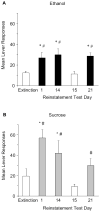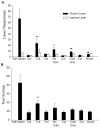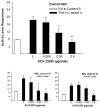The Potent Effect of Environmental Context on Relapse to Alcohol-Seeking After Extinction
- PMID: 21132088
- PMCID: PMC2995923
- DOI: 10.2174/1874941001003010076
The Potent Effect of Environmental Context on Relapse to Alcohol-Seeking After Extinction
Abstract
Environments in which the pharmacological effects of alcohol have been experienced become potent triggers for relapse in abstinent humans. Animal models developed to study the effect of environmental contexts on relapse to alcohol-seeking behavior demonstrate that alcohol-seeking is renewed by exposure to an alcohol-associated context, following the extinction of alcohol-seeking in a different context. Hence, contexts in which alcohol conditioning and extinction learning occur can be critical determinants for whether or not alcohol-seeking behavior is observed. This review summarizes preclinical research to date examining the role of alcohol contexts on the reinstatement of extinguished responding for alcohol. Behavioral studies have elucidated factors that are important for eliciting context-dependent relapse, and have uncovered novel interactions between alcohol-seeking driven by discrete alcohol cues in different contexts. Neuropharmacological studies provide substantial evidence for a role of dopaminergic systems in context-dependent reinstatement, and growing support for opioidergic mechanisms as well. Several key limbic brain regions have been identified in the modulation of alcohol-seeking by context, supporting a proposed neural circuit that includes the hippocampus, nucleus accumbens, basolateral amygdala, lateral hypothalamus, and the paraventricular thalamus.
Figures





References
-
- Wikler A. Conditioning factors in opiate addiction and relapse. In: Wilner DI, Kassenbaum GG, editors. Narcotics. New York: McGraw-Hill; 1965. pp. 85–100.
-
- Laberg JC. What is presented, and what prevented, in cue exposure and response prevention with alcohol dependent subjects? Addict Behav. 1990;15:367–86. - PubMed
-
- Marlatt GA. Cue exposure and relapse prevention in the treatment of addictive behaviors. Addict Behav. 1990;15:395–9. - PubMed
-
- Rohsenow DJ, Niaura RS, Childress AR, Abrams DB, Monti PM. Cue reactivity in addictive behaviors: theoretical and treatment implications. Int J Addict. 1990;25:957–93. - PubMed
-
- Hammersley R. Cue exposure and learning theory. Addict Behav. 1992;17:297–300. - PubMed
Grants and funding
LinkOut - more resources
Full Text Sources
Other Literature Sources
